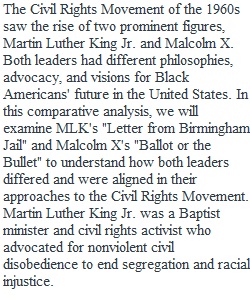


Q For this assignment you will examine the life, advocacy, and philosophies of Martin Luther King and Malcolm X, two polarizing figures of the Civil Rights Movement of the 1960s. You will center your comparative analysis around MLK's Letter from Birmingham JailLinks to an external site. and Malcolm X's Ballot or the BulletLinks to an external site. and draft a comparative analysis. In this comparative analysis, you must include context, in other words, biographies, causes, advocacy, and consider what was happening that caused both men to draft these pieces? I am asking for context because I noticed that some of you miss providing context in your essays. So this is a great time to practice. You also must consider where these men align and differ in theory solutions, goals, and visions for Black Americans as well as where they believe white Americans fit into that agenda. You may consider other issues, themes, or questions as well but the ones I listed must be present. Please revisit the Canvas post regarding essay writing in my course. Please be advised that a bibliography and in text citations must be present. if not an automatic zero will be attached to this submission. PreviousNext
View Related Questions